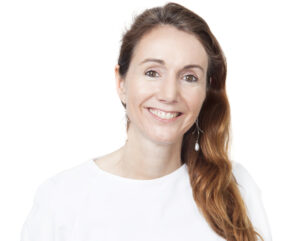Isabelle Delas is Head of Luxembourg Branch of Finance in Motion GmbH.
1. How did you get involved in inclusive finance and impact finance?
In 2002, I started working in the development cooperation sector for the International Development Law Organisation (IDLO), dedicated to promoting the rule of law in developing countries and countries in economic transition. There, I became involved in inclusive finance by contributing to a project, financed by the Omidyar Network and aimed at building inclusive financial sectors and supporting legal and regulatory frameworks.
 Later, I worked on climate finance-related projects tailored to overcome legal and institutional barriers for financing climate change adaptation and mitigation.
Later, I worked on climate finance-related projects tailored to overcome legal and institutional barriers for financing climate change adaptation and mitigation.
Now, working for Finance in Motion GmbH (FiM) definitively gives me an increased exposure to impact finance. My main responsibilities as Head of Luxembourg Branch, besides office and resources management and compliance function, focus on the management of legal-related loan documentation and transactions, and payment of direct operating expenses on behalf of the funds advised by FiM.
Furthermore, I had the opportunity to participate to meetings of the Luxembourg Sustainable Climate Finance Task Force and to the Luxembourg Sustainable Development Finance Platform which have greatly contributed to the mainstream of sustainable finance here.
2.Could you describe the work done by Finance in Motion? And what makes it different from other inclusive finance players?
Finance in Motion is a global impact asset manager focused exclusively on sustainable development in low and middle-income countries. The company develops and advises impact investment funds whose blended finance structures bring together public and private investors to promote economic prosperity, social development, climate change mitigation and adaptation, sustainable use of natural resources, and biodiversity conservation.
Over the course of its operations, Finance in Motion has unleashed a cumulative total of EUR 4 billion toward these goals in Southeast Europe, the Caucasus, Latin America, the Middle East, and North Africa.
As many social and environmental challenges cannot be solved by financial means alone, we take a multidimensional approach to making impact investments by combining investments with technical assistance and research activities. This includes capacity building for local partner institutions, facilitation of sector dialogue, conducting of studies in the field of financial inclusion and promotion of financial education. We believe this approach is the best guarantee for ensuring informed and effective investment strategies, mitigating potential risks and achieving significant impact alongside a financial return.
In addition to that, our investment approach is characterized by proximity to our investees and the markets they operate in. Investment professionals in 16 regional offices source and accompany the investments of our funds.
3.What projects are you currently working on?
One aspect that is repeatedly stressed as key to enhance financial inclusion is the option of borrowing in local currency[1]. Therefore, one of our recent projects supported the European Fund for Southeast Europe (EFSE) in setting up a special instrument that promotes local currency lending, an essential aspect of sustainable and responsible finance in low and middle-income countries. A brand-new share class in the fund’s structure, which is backed by EU and German Government funding, absorbs the exchange rate risk and allows to spread the practice of local currency lending in particularly vulnerable countries and through this, complements other initiatives such as TCX. The SANAD fund, which is also advised by Finance in Motion, has also successfully implemented this instrument for promoting local currency lending in numerous countries of the MENA region.
4. What is your particular interest in inclusive finance?
Although this relates more to impact finance than inclusive finance, I have a keen interest in environmental, social and corporate governance (ESG) criteria that have now become a tool to foster responsible finance. I am convinced that combined with support from the regulator, it will help to raise more private capital for impact investing to make a positive difference for the people and the planet.
5. What are the biggest challenges facing inclusive finance today? And how could InFine.lu and Luxembourg help tackle them?
Financial inclusion has been on the agenda for a long time now. This brings the challenge to keep it up there, to keep it relevant in changing political and economic environments and to support financial institutions of further reaching out to those that are yet to be served. There are still around 1.7 billion people who are unbanked [2] – most of them women.
Supporting start-ups and entrepreneurship is one way of bringing financial inclusion into today’s market, to raising awareness and funding for the topic. At the same time, it has great potential to foster local development. Start-ups, particularly in the emerging markets our funds operate in, require a supportive ecosystem to succeed.
The Entrepreneurship Academies, launched by both EFSE and SANAD, do exactly that: supporting local business development throughout their respective target regions.
InFine.lu and Luxembourg bring important assets to tackle all the above challenges: InFine.lu is very well placed to facilitate knowledge transfer and scaling up of good practices by continuing to connect players of the financial inclusion market and by providing a platform for exchange. Luxembourg as an important market place for the fund industry, can also contribute not only by providing funding for underserved markets but also by contributing with its experience in developing innovative funding vehicles.
[1] The importance of local currency lending for financial inclusion was also highlighted at the recent EFSE Bankers’ Roundtable on Sustainable Financing for Entrepreneurs in Yerevan: https://www.efse.lu/news-events/news/detail/high-level-roundtable-tackles-sustainable-financing-for-entrepreneurs-in-armenia/
[2] World Bank Findex 2017 https://globalfindex.worldbank.org/
InFiNe is the Luxembourg platform that brings together public, private and civil society actors involved in inclusive finance. The value of InFiNe lies in the wide range of expertise characterised by the diversity of its members.
With the support of

Inclusive Finance Network Luxembourg
39, rue Glesener
L-1631 Luxembourg
G.-D. de Luxembourg
Tel: +352 28 37 15 09
contact@infine.lu
R.C.S. : F 9956
Legal notice
Privacy notice
Picture 1 © Pallab Seth
